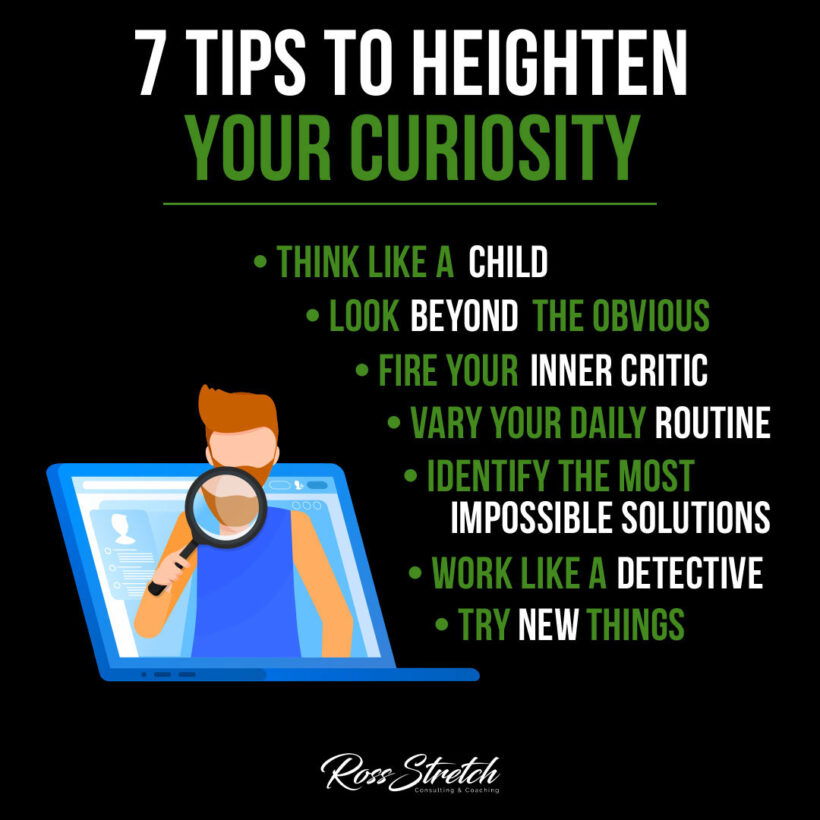Curiosity is at the heart of discovery. Whether you’re trying to boost your creativity, improve problem-solving, or simply become more open-minded, cultivating curiosity can have profound benefits. In this article, we’ll dive into seven practical tips for sparking and maintaining your sense of curiosity in everyday life.
Introduction: Why Curiosity Matters
Curiosity isn’t just about asking questions—it’s about embracing a mindset that pushes you to explore the unknown and view challenges as opportunities for growth. Studies in psychology show that a curious mindset can improve memory, foster innovation, and even strengthen personal relationships. If you’re ready to heighten your curiosity and become a lifelong learner, here’s how you can get started.
Think Like a Child
Reclaim Your Sense of Wonder
Children naturally approach the world with curiosity because everything feels new to them. They ask “why” without fear of sounding naive. As adults, we can cultivate this same sense of wonder by questioning things we usually take for granted.
- Actionable Tip: Choose an everyday object or concept and research its origins or purpose.
- Why It Works: Asking basic questions builds new neural connections and encourages creative thinking.
Example:
Instead of assuming you know how a common tool works (like your phone’s voice assistant), dive deeper into its development and purpose.
Look Beyond the Obvious
Challenge Assumptions
Our brains are wired to find shortcuts, but this can make us overlook new possibilities. Instead of accepting surface-level explanations, practice questioning the status quo.
- Actionable Tip: The next time you encounter a familiar process—at work or in daily life—ask yourself, “What would happen if I approached this differently?”
- Why It Works: This encourages divergent thinking, helping you break free from habitual thought patterns.
Fire Your Inner Critic
Silence the Voice That Says, “That’s a Stupid Idea”
Fear of failure or embarrassment can hinder your curiosity. To counter this, practice self-compassion and remind yourself that curiosity thrives in environments free from harsh judgment.
- Actionable Tip: When brainstorming, write down even the “crazy” ideas without filtering.
- Why It Works: By turning off your inner critic, you allow more creative, original thoughts to emerge.
Example:
Many groundbreaking inventions—like the sticky note—started as “mistakes” that curious minds explored rather than discarded.
Vary Your Daily Routine
Inject Novelty into Your Life
Routines can be efficient, but they can also dull your sense of curiosity. Small changes can reawaken your brain’s ability to notice new things.
- Actionable Tip: Take a different route to work, or try a new hobby or restaurant.
- Why It Works: Novel experiences activate the brain’s reward center, making you more open to new ideas.
Science Insight:
Research shows that small disruptions in routine can improve memory and cognitive flexibility, enhancing your ability to process new information.
Identify the Most “Impossible” Solutions
Think Outside the Box
When tackling a problem, start by brainstorming the wildest, most “impossible” solutions. This strategy helps shift your mindset from limitations to possibilities.
- Actionable Tip: When faced with a challenge, ask yourself, “What would be the wildest solution to this?” Then, work backward to see if there’s a way to make parts of it feasible.
- Why It Works: Thinking beyond conventional answers fosters innovation.
Work Like a Detective
Practice Observational Skills
Detectives excel at spotting subtle clues others miss. Similarly, improving your observation and data-gathering abilities can strengthen your curiosity.
- Actionable Tip: Keep a journal where you note down interesting observations or questions throughout the day.
- Why It Works: Writing things down reinforces learning and prompts you to dig deeper into things that catch your attention.
Example:
You might notice patterns in social situations, like how people react differently to certain phrases, sparking curiosity about communication dynamics.
Try New Things
Step Outside Your Comfort Zone
Curiosity thrives when you expose yourself to unfamiliar situations. Whether it’s trying a new cuisine, learning a language, or experimenting with creative pursuits, stepping outside your comfort zone helps you build resilience and curiosity.
- Actionable Tip: Set a monthly “new experience” goal, such as attending a local class or event you’ve never tried.
- Why It Works: New experiences challenge your brain and expand your perspective, making you more adaptable.
Example:
If you’ve never painted before, take a beginner’s art class—not to master the skill, but to learn how trying something new can shift your thinking.
Final Thoughts: Feed Your Curiosity Every Day
Curiosity is a skill that can be nurtured with intentional practice. By incorporating these seven tips into your daily life, you’ll not only strengthen your capacity to learn but also open the door to exciting new possibilities. Remember: the more curious you are, the more the world will reveal its wonders to you.
Recommended Reading and Resources
By following these simple steps, you can foster a curious mindset and embrace lifelong learning meaningfully.


